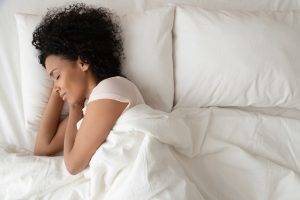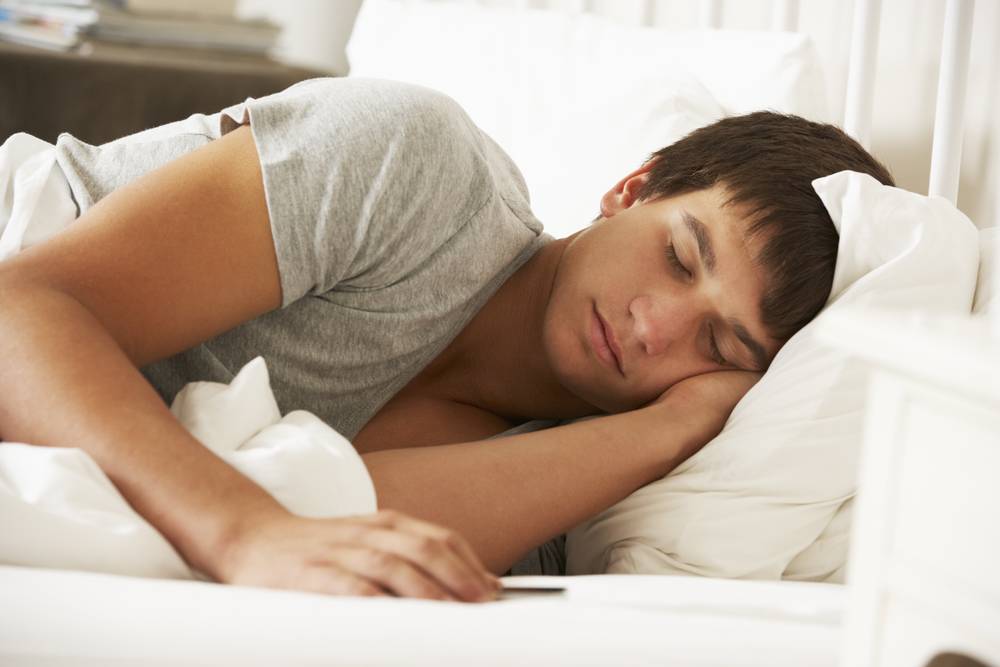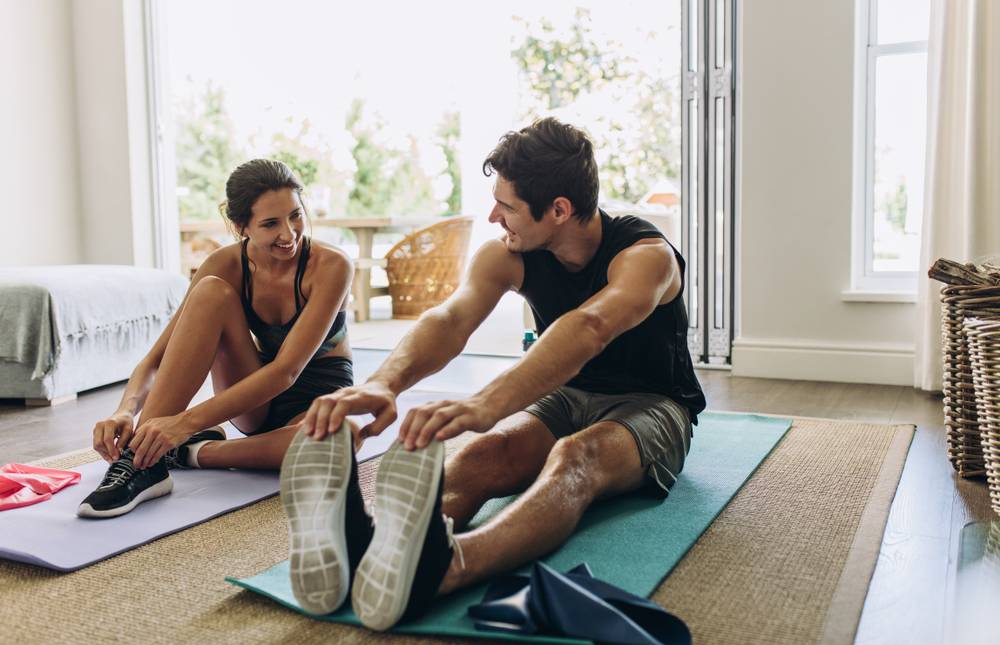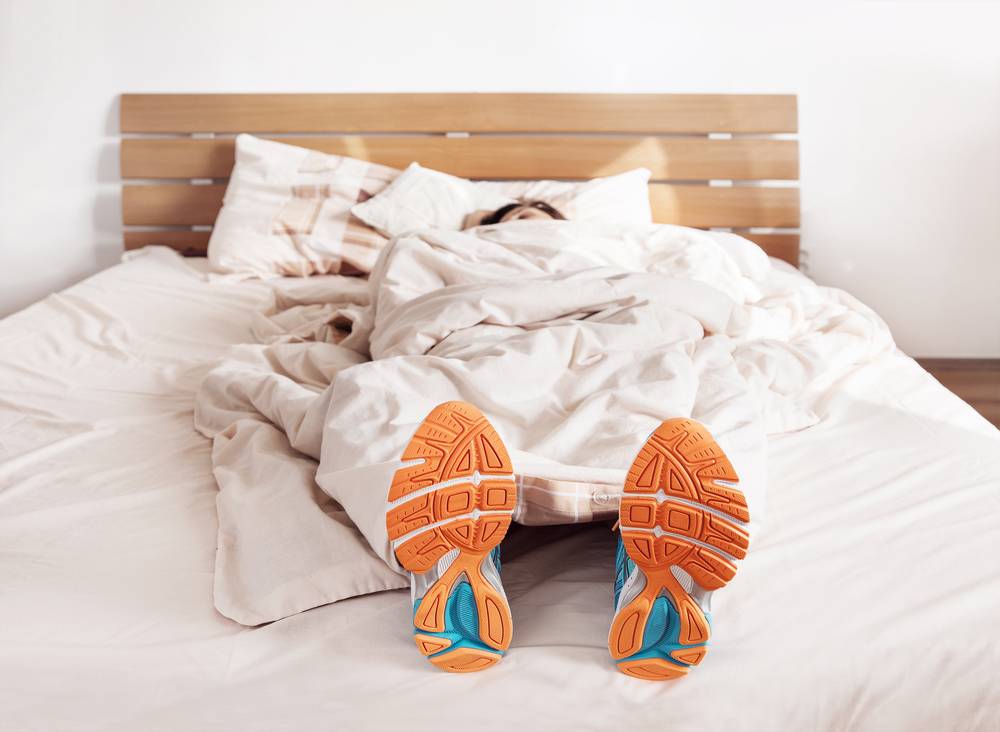
If you’re physically active, the need for proper sleep is even more important. Sleep deprivation in people who workout can lead to various negative effects including:
- Increased feeling of exhaustion during physical activity
- Longer recovery time
- Increased risk of injury
With that being understood, many athletes ask the question: “Do you need more sleep if you exercise regularly?” To understand the answer, let’s delve into the science that directly links proper sleep and physical activity in ways you may have never even considered.
Understanding the Biology of Exercise and Sleep
You don’t need a degree in biology to understand the basics. When we sleep, our bodies are given time to recover from the activities of the day. It’s a time of energy conservation and repair. However, there are a few less obvious biological factors at play that connect sleep and exercise.
— Human Growth Hormone
Proper sleep is associated with an increased production of human growth hormone. This is the hormone that causes growth in children and teens. In adults, it’s primarily responsible for the development of lean muscle and repair of damage commonly sustained during intense physical activity.
— Adenosine
Exercise results in a direct chemical effect on the brain through the increased production of adenosine, a metabolite that slows the activity of neurons. When nerve cell activity is slowed, it produces a feeling of drowsiness. (Caffeine blocks adenosine, which is why that morning cup of coffee helps you become more alert).
— Regulation of Circadian Rhythm
Your body’s internal clock is known as your circadian rhythm. When you engage in regular exercise, it helps the body internalize its schedule. Research suggests engaging in morning exercise is the best way to maximize the benefits of the circadian rhythm as it’s shown to prime the body for optimal sleep at night.
How Much More Sleep Do Exercisers Need?
We’ve established that average adults need between 7-9 hours of sleep. It’s important to note that fewer than 25% of American adults get the recommended amount of exercise. If you exercise regularly, you’re among the minority, so your sleep needs are not considered “average.”
What’s the Recommended Amount of Exercise for Adults?
The American Heart Association recommends adults consistently get 150 minute of moderate aerobic activity per week, 75 minutes of intense aerobic exercise or a combination of the two. It’s also advised to spend at least two days per week engaging in moderate-to-intense weight training. How do these recommendations translate to sleep needs? In a nutshell:
- If you are getting the recommended amount of exercise, aim for the higher end of the 7-9 hour sleep recommendation.
- If you surpass the recommended amount of exercise, aim for 8-10 hours of sleep.
Sleep and Exercise Work Hand-in-Hand
Sleep and exercise share are interchangeably linked. While sleep is a critical component when it comes to allowing the body to recover from exercise, exercise helps promote restful sleep. In 2013, the National Sleep Foundation conducted a poll in the United States to reveal just how much of an impact exercise has on sleep. They unveiled five main results that help us understand the link between sleep and exercise:
1. Exercisers report better sleep quality.
Over 75% of participants who engaged in regular exercise reported good or very good sleep in the past two weeks while only around 50% of non-exercisers reported the same.
2. Day or night, exercise has a positive effect on sleep quality.
While there is evidence to support a morning workout can kickstart your circadian rhythm, working out at any time of day has a positive effect on sleep quality.
3. Non-exercisers are more susceptible to sleep apnea.
A direct correlation was noted between the risk of sleep apnea and levels of exercise. Amongst participants in the poll, those at moderate risk are broken up as follows:
-
- 44% of non-exercisers
- 26% of light exercisers
- 19% of vigorous exercisers
4. Those who report vigorous activity levels are the most likely to experience excellent sleep quality.
When compared with non-exercisers, those who report going above recommended exercise standards are more than twice as likely to report excellent sleep almost every night. They were also the least likely group to report any type of sleep problems.
5. Excessive time spent sitting is linked to poor sleep quality.
Participants reporting less than eight hours spent sitting during the day were more likely to experience very good sleep quality.
If you exercise regularly but not necessarily vigorously, there are still benefits as evidenced by a study conducted by the Sleep Disorder Service and Research Center. While it did reveal maximum benefits are associated with intense exercise, even 80 minutes of low-to-moderate intensity results in the ability to fall asleep more quickly. The bottom line?
“Exercise helps sleep. Sleep helps exercise”
Special Sleep Needs for High Intensity Interval Training
High intensity interval training, commonly known as HIIT, is a form of exercise consisting of short bursts of intense anaerobic activity followed by longer periods of rest or less intense exercise. Although very vigorous, there are many unique benefits of HIIT that keep exercisers coming back for more:
- Designed to be completed in 20 minutes or less, a great benefit for those on a tight schedule
- Enables the body to burn more calories post-workout than has been observed in the hours following longer periods of steady-state exercise like jogging
- Has been shown to help exercisers burn more fat when compared with continuous, moderately-intense exercise like running
- Improves cardiorespiratory function and can help lower both blood pressure and blood sugar
As a YMCA HIIT instructor, I’ve regularly experience the sleep benefits that follow this type of training. It’s worth noting, though, that this level of exercise requires longer recovery time. I feel best rested following a HIIT workout with around nine hours of sleep. HIIT participants should make time for 8-10 hours of sleep, especially if your session lasts longer than 20 minutes.
When Low Intensity Exercise is More Beneficial for Sleep
While multiple studies suggest any exercise, regardless of the time of day, is better than no exercise when it comes to sleep quality, choosing the right type of workout for your schedule can help you maximize the benefits.
Some of us can stick to getting up before work and hitting the gym first thing in the morning. However, if you’re the type who hits the snooze button, early morning workouts may not be the right fit, and that’s okay. Depending on time of day, you can use science to map out the most efficient workout to facilitate great sleep:
High intensity workouts are most beneficial for sleep when performed in the early morning hours.
Moderate-intensity workouts and strength training are great if you can workout in the late morning to afternoon to reduce pre-sleep anxiety.
If you can’t workout until the evening hours, shoot for longer workouts at a lower intensity since formats like HIIT are more likely to delay sleep onset.
Remember, you can switch things up. For example, suppose weekends are more compatible with early sweat sessions. Save Sunday for HIIT training, and get your moderate-intensity and resistance training in after work or on your lunch break.
Sleep vs. Working Out- Is It Ok to Skip If You’re Tired?
If you’ve ever tried to write a paper or study for a test on little sleep, you understand the negative impact the deprivation makes on your brain. Oftentimes, a bout of writer’s block is cured by a good night’s rest. Similarly, your body is unable to make the most out of gym time when it’s lacking proper rest. Ergo, sometimes it’s better to sleep than workout.
Let’s take a look at some common scenarios.
• You enjoyed a full 7-9 hours of sleep the night before.
You’ve got the green light to hit it hard at the gym. Your body is properly charged to make the most out of every minute.
• During the past seven days, you’ve averaged six hour or less of nightly sleep.
While you should workout, the quality of your gym sessions are compromised as your body is unable to properly rejuvenate. Think of ways you can get more sleep. For example, you can make a hard rule that all electronic devices including the television and computer are off an hour before bedtime. This promotes the production of melatonin and prepares your body for sleep. Instead of browsing social media, spend a half hour preparing for the next day by setting out your clothes and packing your lunch. This allows you some extra time to sleep in the morning.
• You were up late the night before.
Although you should avoid late nights, they happen. When they do, it’s okay to trade in your morning workout for extra sleep.
• You were too lax all week and only worked out once.
You should aim to workout at least three times a week. If you slacked off, and the weekend is right around the corner, it’s time to get moving!
You hit it hard at the gym with consistency.
If you worked out four or more times during the week, it’s okay to take the day off. Your body needs to repair, especially if you’re engaging in hypertrophy training aimed at muscle gain.
• You’re sore.
To avoid overtraining, always give your body some time to repair when it’s sore. Micro tears in the muscles repair stronger, and they need ample R&R to fully process gains.
Is It Okay to Nap after a Workout?
Feeling wiped out after your workouts? It can be tempting to take a catnap after a sweat session, and this can sometimes be a good idea. However, this isn’t always the case. Let’s take a look at the pros and cons of napping after a workout.
| Pros | Cons |
|
|
Sleep & Exercise: Making the Most of a Symbiotic Relationship
Quality sleep is directly related to exercise, and understanding the nature of this connection can help you foster the marriage of these two critical biologic functions. Do you need more sleep if you exercise? There is no one-size-fits-all answer with so many components at play. One thing’s certain. Adequate exercise encourages quality sleep, making each hour spent in bed more efficient.
Sleep and exercise, when properly balanced, contribute to both your physical and mental health. Knowledge is power, and understanding how to maintain equilibrium in physical activity and relaxation allows you to live your best life.
Did you find this article helpful? Share it with your friends!
Have lingering questions or something to add? We’d love to hear your thoughts in the comments section below!
Photo credit: Soloviova Liudmyla/Shutterstock; fizkes/Shutterstock; Monkey Business Images/Shutterstock; Jacob Lund/Shutterstock


